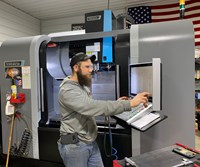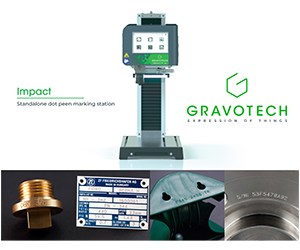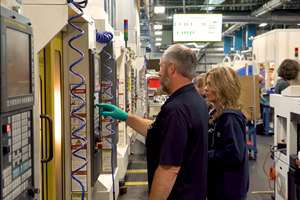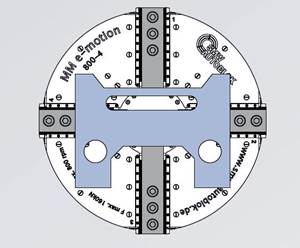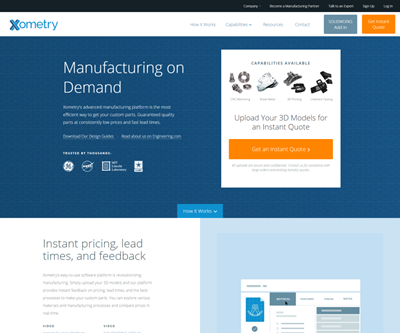Eliminating “Islands of Production” with More and Better Data
A portal that reminds me of Uber today holds the promise to perform like eHarmony in the future, its CEO says.
There was a time when the phrase “islands of automation” was frequently used to describe a challenge inherent to CNC machine tools. That is, these machines—powerful as they are—have traditionally run in isolation from one another and from the management systems in the shop. Such is still the case in most manufacturing facilities. However, we don’t hear this phrase so much anymore, because it has become dated. In an ever-increasing number of shops, many or all of the CNC machine tools are networked into a common system providing data reporting for real-time, shop-wide performance and capacity analysis. Now, the circle of what we might recognize to be isolated has grown. It is these shops, networked or otherwise, that are the disconnected islands.
In short, individual shops today largely remain “islands of production,” without digital outreach to other facilities, including to their customers. Will the day come when this separation also comes to an end?
Likely yes. However, the connection won’t necessarily take the form of direct networking in the same way the machine tools in a shop are networked. I recently caught a glimpse of what the connection might look like.
I had fun not long ago playing with Xometry. Or more specifically, playing with Xometry’s website. The company is a manufacturing portal connecting buyers of manufacturing services (machining, sheet metal, 3D printing) with a community of currently more than 200 vendors providing one or more of these services. For buyers, a neat feature of Xometry’s site is immediate, automated quoting. The buyer uploads a CAD file and specifies material and quantity to get automatically generated pricing on that job. The site even quotes different prices for different processes selected, enabling a comparison between 3D printing and machining, for example. I uploaded some part models Xometry gave me, and also the model of a much stranger part I happened to have in hand, just to see what price the site would quote.
The system is getting more accurate all the time, says CEO Randy Altschuler. Through machine learning, it relates similar jobs to one another according to part features, then uses the similarities it finds to base quoted prices on quotes that have been accepted in the past, versus quotes that were not accepted because (presumably) the price was too high. An iterative process is thus drawing nearer and nearer to the true market price for every given type of part. And a similar process is at work in the somewhat lower prices offered to the vendors carrying out that work. The difference between buyer price and supplier price is what Xometry earns for managing and standing by every job. The resulting model—instantaneous pricing of manufactured parts with no RFQ—promises to simplify the search process that brings many buyers of machined parts together with suppliers. Indeed, if such a model can catch on and expand, then it will mean no such search process is needed in many cases. The interface will suffice. Think of it as the Uberization of manufacturing.
Yet as transformative as that might be, that is not the limit of what the company leader foresees. Ridesharing utility Uber might not the ultimate analogy. He says a better one might be the matchmaking site eHarmony.
“Matchmaking is what we are doing,” he says. “We aim to connect buyers with the best partners (Xometry’s term for shops), using machine learning and matching algorithms to make that happen.” Right now, operations performed and pricing patterns over time are the data feeding these algorithms. But in the same way that eHarmony asks hundreds of questions of users to provide a better romantic match than other dating sites, what if machining vendors could offer up much more information in the hope of finding an even better match with buyers?
The CEO describes what that might look like. He says, “The list ideally includes total capacity, available capacity, number and capabilities of machines, certifications, standard lead times, preferred materials, production capabilities (versus prototyping) and inspection capabilities”—all reported dynamically and updated in real time. If shops could routinely supply this much data to the third-party portal, then they could see their capacity more efficiently used, as the expanded data would enable a system such as Xometry’s to better connect each shop’s capabilities with the work it is best equipped to perform in that moment.
“Quite literally, more and better data is going to mean more business for manufacturers,” Mr. Altschuler predicts.
The shops themselves will thus begin to resemble the data-outputting CNC machine tools in some of their own facilities. That is, in the same way that unified data reporting brings increased efficiency within a shop, a different form of unified data reporting promises to bring a similar efficiency increase across an industry of manufacturers nationwide.
Related Content
Reinventing a Precision Shop With a Data-Driven Mindset
When this machine shop lost 90% of its business within three months, a reinvention was in order. Here's how it survived after quickly falling on hard times.
Read MoreHow this Job Shop Grew Capacity Without Expanding Footprint
This shop relies on digital solutions to grow their manufacturing business. With this approach, W.A. Pfeiffer has achieved seamless end-to-end connectivity, shorter lead times and increased throughput.
Read MoreShop Quotes Smarter, Works Harder with Machine Monitoring
Temco first installed MT-LINKi to optimize quoting. Now, the software helps the shop optimize its machines — and machine purchases.
Read MoreWireless Couplers Work Wonders for Workholding
Possibilities range from individual control of chuck jaws and tombstone fixtures to more reliable robots.
Read MoreRead Next
GE Ventures Grants Funding to Machine Capacity-Sharing Platform
Xometry networks SMEs with customers in need of on-demand custom parts.
Read More3 Mistakes That Cause CNC Programs to Fail
Despite enhancements to manufacturing technology, there are still issues today that can cause programs to fail. These failures can cause lost time, scrapped parts, damaged machines and even injured operators.
Read More
.jpg;width=70;height=70;mode=crop)



